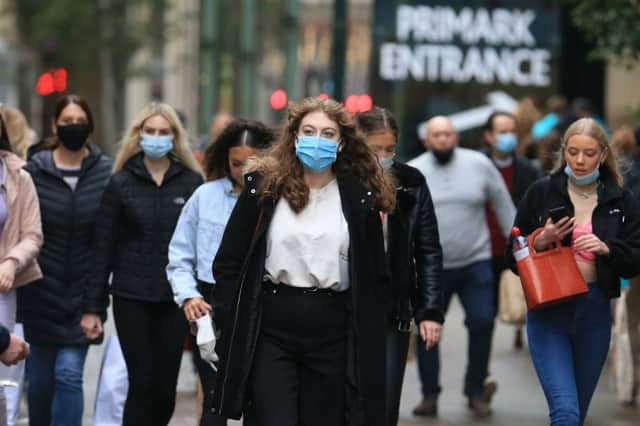Boris Johnson confirms all Plan B restrictions to end in England


Plan B Covid-19 restrictions in England will be allowed to expire, the Prime Minister has confirmed.
Boris Johnson told MPs in the House of Commons that latest figures show the Omicron wave appears to have peaked nationally, while Covid-related hospital admissions have stabilised, and even dropped in the capital.
Advertisement
Hide AdAdvertisement
Hide AdThe PM added that more than 90% of over-60s across the UK had now had a booster vaccine to protect them, and stressed that the government “got the toughest decisions right”.
He told the Commons: “Today’s latest ONS data show clearly that infection levels are falling in England and while there are some places where cases are likely to continue rising, including in primary schools, our scientists believe it is likely that the Omicron wave has now peaked nationally.
“There remain, of course, significant pressures on the NHS across our country, and especially in the North East and North West, but hospital admissions which were doubling every nine days just two weeks ago have now stabilised, with admissions in London even falling. The numbers in intensive care not only remain low but are actually also falling.”
“So, this morning, the Cabinet concluded that because of the extraordinary booster campaign, together with the way the public have responded to the Plan B measures, we can return to Plan A in England and allow Plan B regulations to expire.
What rules are changing?
Advertisement
Hide AdAdvertisement
Hide AdThe Prime Minister confirmed Plan B Covid measures will come to an end from Thursday next week (27 January).
From this date, mandatory Covid passes will no longer be needed to access venues large events, and work from home guidance will come to an end.
Mr Johnson also said the UK government will no longer mandate the wearing of face masks anywhere in England, and they will be scrapped in classrooms from this Thursday (20 January).
The guidance to wear coverings in communal areas will also be removed.
Advertisement
Hide AdAdvertisement
Hide AdThe government will still "suggest" the use of face coverings in cramped or crowded spaces, but will “trust the judgment of the British people”.
The PM also confirmed the intention to end the legal requirement to self-isolate in the coming weeks.
He told MPs: “As we return to Plan A, the House will know that some measures still remain, including those on self-isolation.
“In particular, it is still a legal requirement for those who have tested positive for Covid to self-isolate.
Advertisement
Hide AdAdvertisement
Hide Ad“On Monday we reduced the isolation period to five full days with two negative tests, and there will soon come a time when we can remove the legal requirement to self-isolate altogether, just as we don’t place legal obligations on people to isolate if they have flu.
“As Covid becomes endemic, we will need to replace legal requirements with advice and guidance, urging people with the virus to be careful and considerate of others.
“The self-isolation regulations expire on March 24, at which point I very much expect not to renew them. Indeed, were the data to allow, I’d like to seek a vote in this House to bring that date forward.”
Mr Johnson announced that restrictions on visits to care homes will also be eased further, with Health Secretary Sajid Javid due to set out plans “in the coming days”.
What about travel rules?
Advertisement
Hide AdAdvertisement
Hide AdAs for changes to current Covid travel restrictions, the PM said the government will make an announcement on this “in the next few days”.
He told MPs: “We will certainly review testing arrangements for travel and the Health Secretary will be making a statement in the next few days on that.
“I think it’s very important everybody in the country understands that getting your booster, wherever you want to go in the world, getting your booster is going to be a pretty crucial thing to do.”